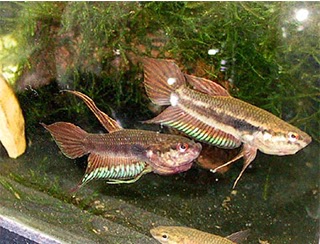Truly an experienced breeder was not always successful breeding betta fish,
betta fish breeder experienced already been successful when reaching a minimum
success rate of 60 %. This means that of all the eggs, fry who lived about 60
%.
Going out and fertilized eggs were males. Male parent will take the fertilized eggs in her mouth and laid in foam nests. Repeatedly until the eggs run out. When you have exhausted the female will be silent corner of the base of the container. And should be removed from the place of spawning females. The male parent will care for the eggs until they hatch, the larvae will be treated as well as until it can find their own food.
Larval rearing workable treatments like fish larvae in general. Spawning betta coccina another and not as easy splendens. In a match is not necessarily the male and female parent will want to spawn even if placed in the same container until whenever. To work around this, a set of betta coccina left to choose their own spouses, if the pair already look destined then lifted and separated on its own spawning aquarium.
Although it is destined to remain patient because sometimes many months then both would spawn. Spawning in the aquarium should be given a little floating aquatic plants as a hiding place. Like a regular betta spawning, the male betta will make foam coccina under water plants then he would roll and females lay their eggs in the foam nests.
see also how to train dogs
Many beginners who failed to pass during the first two weeks of breeding betta
fish. The question that often arises from the first-time beginner breeding
betta fish fry is why often die in the first few weeks, why eat the eggs and
the male parent her own child, how to give feed the young fry?.
Some things are the key to success in raising betta fish, especially in the critical period the first two weeks of life that needs to be considered is.
Some things are the key to success in raising betta fish, especially in the critical period the first two weeks of life that needs to be considered is.
Broodstock
Sires plays an important role in spawning, both male and female parent.
Choose ripe broodstock for spawning. That is old enough. Betta fish entering
productive after more than 4 months old, then you should select a 6 month old
who has been really productive.
Healthy male parent, no defects, have good genes and should be larger than
the female parent. This is so that when spawning, the male should be able to
roll that females spawning is complete. Healthy males will be able to produce enough foam nest for her eggs and put the
hard work can go up and down the aquarium care for fry after hatching. The
female parent should look fat containing eggs and ready to spawn.
Male parent will play an important role in the maintenance of seed during the
critical first two weeks. Good male parent is to care for the eggs and their
children. Male parent should remain with their children during the first two
weeks, while the female parent removed from the aquarium immediately after
spawning.
Water
Water is very influential on survival of newly hatched fry. Water conditions
should be stable and in accordance with the betta fish habitat. Parameters
such as water temperature, pH, and hardness must be maintained and drastic
changes in the parameters that should be avoided.
The recommended temperature 24-26 degrees, pH 6.5 to 7.2 and a hardness of 8.5
-10 dH. Water should also be clean of food debris and grime. Levels of
ammonia dissolved in water decomposes into nitrite may increase if there is a
lot of dirt, so it will reduce the amount of dissolved oxygen needed by seed.
When the nitrite content exceeds 0.2 mg / liter, would endanger the life of
the fish. High Ammonia can also be toxic to fish, then try the fry feeding is
not excessive. Male parent also serves to be able to spend the rest of the
food in the aquarium, of course, with the appropriate amount. Water can be
replaced 30 % after the age of 10 days to seed, the manure aspirated using a
new water hose and given as much water is wasted.
Woof
Seed needs food that matches the size of his mouth, many fry deaths from
starvation due to lack of adequate food and meet their individual needs. Gave
an excellent live food for fry. Feeding food scraps do not go overboard because it can be foul and poison the
fish. Live feed is commonly given infusoria, microworm, vinegar eel,
artemia and daphnia. That must be considered is the portion of food, feed
should be spent by the seed within two minutes and given twice a day, every
morning and afternoon.
Environmental Conditions
Weather conditions often extremely inhospitable, because frequent changes.
The weather affects the lives of seed. Drastic temperature changes result in
changes in water temperature in the spawning aquarium. Seed requires a stable
temperature because it is still very vulnerable. Avoid aquarium from the heat
immediately and rain. Spawning aquarium should be placed in the room that is
away from the outside weather changes.
Outside disorders
At the time of spawning, the aquarium should be closed, both walls of the
aquarium as well as on it by using paper or other cover. Parent betta fish
will be stressed if no outside distractions such as passing people, cats,
dogs and even betta fish respective owners. Usually beginners who really want
to know the development of spawning often see the fish, thus unconsciously
make the male parent is interrupted. As a result the male parent can take in
an effort to protect their children.
Swimming Enlargement
Broader rearing ponds can help the process resulting in faster growth of large
seed. Seed can be moved to rearing ponds at the age of seven days. Rearing
ponds also provide opportunities for fry can enjoy a wider space. Noteworthy
is the aquarium water parameters between spawning and rearing ponds should be
the same, so that environmental changes do not cause the death of the seed.
All male parent can be moved into the pond to fry two weeks of age.
Spawning with Bubblenester
Several types of betta fish spawn by making a nest of foam. Examples are fish
betta splendens already spawning many people. Spawning sites can be in a small
aquarium or tub equipped floating aquatic plants as nest to attach foam.
Parent mature male gonads included in the spawning container and when it is
made of foam nest, the female parent can be mixed mature gonads.
 |
| Betta Fish Breeding |
If they match then there will be spawning, but if not then the mother would be
attacked until the wound. Replace it with a suitable female. If the parent is
fit, spawning occurs in a way the male will embrace the female parent to put
his body into the female's body in the water column near the surface near the
froth.
Going out and fertilized eggs were males. Male parent will take the fertilized eggs in her mouth and laid in foam nests. Repeatedly until the eggs run out. When you have exhausted the female will be silent corner of the base of the container. And should be removed from the place of spawning females. The male parent will care for the eggs until they hatch, the larvae will be treated as well as until it can find their own food.
Larval rearing workable treatments like fish larvae in general. Spawning betta coccina another and not as easy splendens. In a match is not necessarily the male and female parent will want to spawn even if placed in the same container until whenever. To work around this, a set of betta coccina left to choose their own spouses, if the pair already look destined then lifted and separated on its own spawning aquarium.
Although it is destined to remain patient because sometimes many months then both would spawn. Spawning in the aquarium should be given a little floating aquatic plants as a hiding place. Like a regular betta spawning, the male betta will make foam coccina under water plants then he would roll and females lay their eggs in the foam nests.
 |
| Betta Fish Breeding |
When spawning, both showed beautiful color and become very aggressive. The
females may be more fierce and can even kill the males. At the time of
spawning, the female parent will dwell rigid while the male parent will be
flushed and fertilize the female egg. The eggs then collected and placed in a
foam nest. After spawning is complete, the male will drive the female away
from the nest foam, and can be removed.
Usually three days later the eggs will hatch. The number of seed usually is
not much, only about 30-50 tails. Male parent was appointed after the fry can
swim normally and allowed to live their own seed.
Spawning Mouthbrooder
Several other types of betta fish will spawn in a way incubating eggs in the
mouth as the Betta channoides. Spawning takes place with ease , both in the
community and spawning aquarium specific, ie only one pair of the container.
When spawning takes place, the color of the parent will be more interesting.
 |
| Betta Fish Breeding |
As with other types of betta fish, spawning is done between males and females
with a circular embrace each other. Parent females release eggs and
immediately fertilized by the male parent. Male parent will take the eggs and
incubating eggs in the mouth for 12-14 days before her children removed from
her mouth. The number of fry ranged between 3-40 tail. Unlike splendens,
breeding channoides can together maintain her without prey
.see also how to train dogs







No comments:
Post a Comment